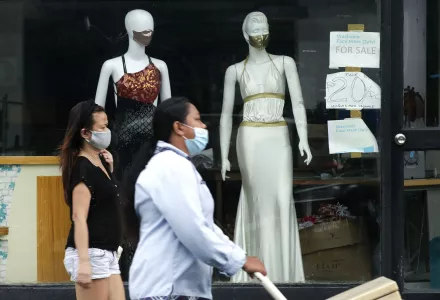Article

Our weekly COVID-19 and Economic Diplomacy tracker looks at policies that impact the coordination of international governments and central banks, ongoing commentary and analysis, and asks what these turbulent times mean for economic diplomacy.
We’d love to hear what you think. Send us your comments, and be sure to follow us on Twitter @BelferEDI.
The Highlights
- A pre-pandemic Federal Reserve survey found that although family finances increased between 2016 and 2019, inequality also increased.
- The eurozone’s economic rebound shows signs of slowing as cases rise throughout the bloc.
- Poverty in Asia will rise for the first time in 20 years, with 38 million people either remaining or pushed back into poverty due to the pandemic.
U.S. Developments
- The terms of the Fed’s Main Street lending program, intended to help medium-sized businesses, have kept bank loan officers from extending credit. Of the program’s $600 billion capacity, less than $2 billion has been used. Banks cite the risk to themselves, reporting requirements, and restrictions as why they have not made more loans. Instead, banks can make loans without the program’s help.
- A Federal Reserve survey of family finances between 2016 and 2019 showed that as median net worth increased, so too did inequality. Median net worth increased by 18% yet many Americans had less in savings that they did before the last recession a decade ago and the share of wealth owned by the top 1% of households was near a 30-year high. Only the richest 10% of households held more wealth in 2019 than on the eve of the 2007-2009 recession. The pandemic will undoubtedly worsen inequality in the U.S.
European Developments
- The European Commission’s monthly survey of business and consumer confidence rose at its slowest pace in five months. This “waning pessimism” only adds to signs that the eurozone’s economic recovery is losing momentum. The overall eurozone economic sentiment indicator rose 3.6 points to 91.1, the highest level since the pandemic began but remains well below pre-pandemic levels.
- European Central Bank president Christine Lagarde warns that the eurozone is expected to remain in deflation for the coming months. The euro’s appreciation is a contributing factor along with a sustained fall in prices and the temporary reduction in the VAT rate in Germany. The ECB forecasts the period of deflation to be limited; however, eurozone inflation is not expected to rise above 1.3% in the next three years which is well below its ~2% target.
- The UK economy shrank by 19.8 percent in the second quarter, the largest recorded fall and the worst contraction among major economies. Its economy contracted more than twice as rapidly as the U.S. and Germany. Overall, the economy shrank by 21.8% in the first half of the year which is the fattest pace of any G7 economy. Though the UK is on track to register a record expansion in the third quarter, economists warn growth could falter given the new restrictions as infections rise. In addition, a further 1 million people will lose their jobs by the end of the year, hitting young and low-skilled workers the hardest.
Emerging Markets
- The World Bank warned the number of poor people in east Asia will rise for the first time in 20 years. The pandemic is not only hitting the poor the hardest but is creating a “new poor,” with up to 38 million people set to remain stuck or be pushed back into poverty. The bank stated that due to the pandemic 33 million who would have escaped poverty will remain in poverty; an additional 5 million people who were not considered poor would be pushed into poverty. Unless countries liberalize their economies and increase social safety nets, regional growth could decrease by 1 percentage point a year.
- Developing economies have raised more than $100 billion on international bond markets, averting fiscal catastrophe. However, analysts warn that while borrowing now may address problems in the short-run, the longer-run economic effects of the pandemic will be difficult to shrug off. For many of the emerging markets, GDP has contracted in the double-digits, and many countries’ public finances have been devastated. Moody’s expects the ratio of debt to GDP to rise by an average of 10 percentage points this year alone in the 19 biggest emerging markets.
Odds and Ends
- Sarah Zhang writes in The Atlantic of the looming logistics chaos once a COVID-19 vaccine is approved.
- Johnny Harris, Nicholas Kristof, and Adam Ellick explore in a New York Times opinion video on why America, which wrote the global playbook for pandemic response, got its response so wrong.
- Philip Bump provides analysis in the Washington Post on COVID-19 death statistics. One sobering figure is, with the world surpassing 1 million deaths, one in five victims were American, and over the past seven days, an American has died of the coronavirus just under two minutes, on average.
- Zeynep Tufekci writes in The Atlantic about the overlooked variable of k – the measure of dispersion – and how it can help combat the pandemic.
Recommended citation
Suh, Hannah. “This Week in COVID-19 and Economic Diplomacy: ‘Poverty in Asia will Rise for First Time in 20 Years’.” October 2, 2020


